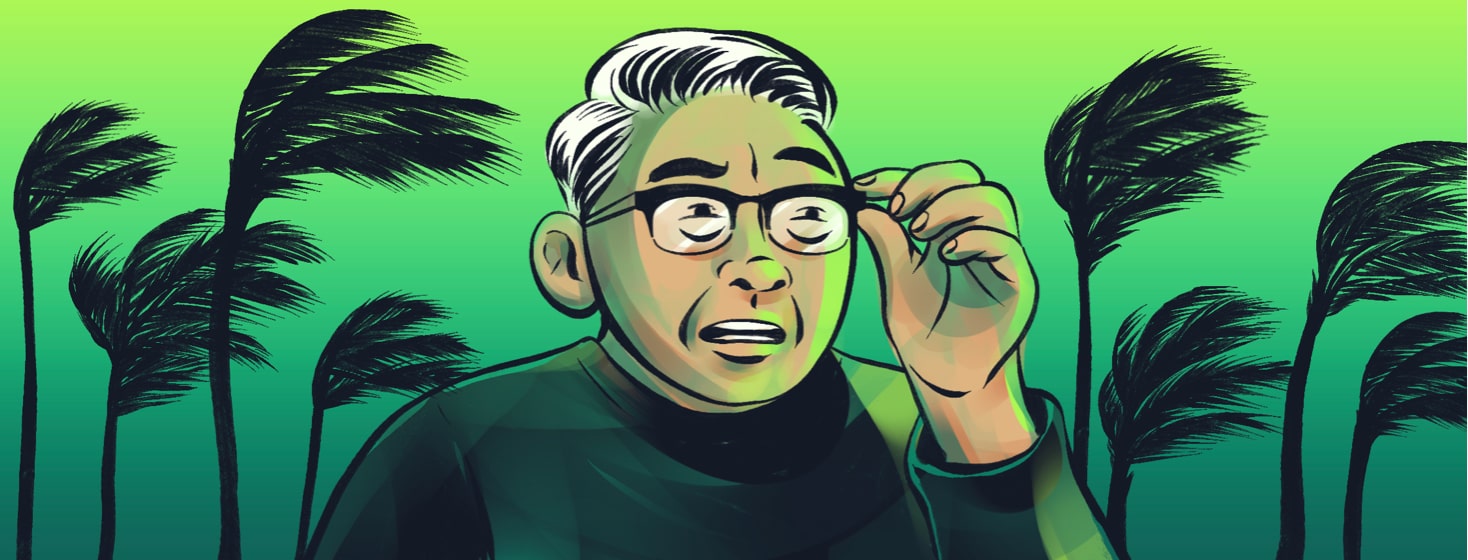Hurricanes and Tropical Storms Create Challenges When Living With Low Vision
It’s paradise down here. Well, most times, anyway.
Living in hurricane country
There are those pesky hurricanes to deal with. I’ve lived in “hurricane country” for most of my life. I grew up in South Florida and now live on the gulf coast — I’m on the eastern shore of Mobile Bay, very near the Gulf of Mexico. And wow! The past few years have been crazy!
Here are a few examples of what I’ve dealt with in just the last few years due to these hurricanes:
Damaged and fallen trees
We have had almost a dozen trees taken down by our tree surgeon! These trees were either damaged or even blown over by a combination of high winds and excessive rainfall. It's very expensive — I don’t even want to add up all the money I’ve spent on this, it’s too depressing... haha.
Home repairs
Roof and house repairs, also expensive. But I have a dear friend who is very skilled in carpentry, electrical, and other handyman skills. Together we have made many repairs ourselves and avoided paying some contractor to do it. My friend isn’t even human, really; I think he’s at least half angel! More on this later.
Sheltering family
My wife and I have become innkeepers after a fashion. Haha! What I mean is, a large part of our family resides in New Orleans. Hurricane Ida required that they vacate to our house. So, a daughter and son-in-law, 2 sweet granddaughters, and their dog moved into our house for 10 days and 10 nights!
How did the 10-day visit go, you ask?
Splendidly! It was a true bonding experience with my 8- and 11-year-old granddaughters and their parents. The experience was like one very long slumber party. The benefits far outweighed the added stress.
A funny thing happened... the visiting dog and my dog simply hated each other! There were no fights or blood, but it got close a few times. They eventually made an uneasy truce when my little dog was allowed alpha status and resumed her title as head diva in charge.
The impact of low vision on life in hurricane country
Things that used to be easy have become difficult for me. To refresh my situation for you, I am 73, and my wife is 74. My eye with dry macular degeneration (AMD) went into geographic atrophy, or GA. My vision went from 20/30 to 20/400 in about 1 year! This makes me legally blind in that eye. My other eye has wet AMD and, after more than 80 injections, is hanging in there at 20/30 to 20/40, depending.
Examples of how my new low vision state impacts my lifestyle:
- No more night driving for me. Also, no driving at dawn or dusk or in foggy conditions.
- Depth perception! This has been severely reduced. Going down stairs, pouring liquid into a glass or cup, and many other everyday things we take for granted now take extra care on my part.
Not long ago, I also found myself on my patio deck at night with the wind howling and rain coming in sideways with no electricity. There I was in the dark with a feeble flashlight and my portable gas-powered generator and trying to start it.
What happened? Well, I got it started, but it was very frustrating. You see, things that used to be easy are now a formidable challenge.
Helpful friends
But, more about my “half-angel/half-human” friend. It seems adversity and hardship bring out the best in people. This is a very true statement and is borne out time and again around these parts. It’s really amazing and touching to see how friends, neighbors, and even strangers are willing to do good deeds when times are tough. Paying it forward is a real thing, and it’s beautiful to see. It’s even more gratifying to do.
Our community right here at MacularDegeneration.net is an example of the best part of the human spirit. I have witnessed people helping people on our site many, many times, and I’m glad to be a part of our shared journey. I wish us all the best!
Editor's Note: As of August 2023, 2 drugs known as complement inhibitors — Syfovre® and Izervay™ — have been approved by the US Food and Drug Administration (FDA) to treat geographic atrophy (GA).

Join the conversation